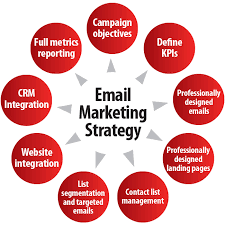The Fundamentals of Digital Marketing Concepts
In today’s digital age, understanding key concepts in digital marketing is essential for businesses looking to reach and engage with their target audience effectively. From search engine optimisation (SEO) to social media marketing, here are some fundamental concepts that every marketer should be familiar with:
SEO (Search Engine Optimisation)
SEO is the practice of improving a website’s visibility on search engine results pages through organic (non-paid) methods. By optimising website content and structure, businesses can increase their chances of ranking higher in search engine results, driving more organic traffic to their site.
SEM (Search Engine Marketing)
SEM involves using paid advertising to appear in search engine results pages. This includes pay-per-click (PPC) campaigns that allow businesses to bid on keywords relevant to their products or services and pay when users click on their ads.
Social Media Marketing
Social media marketing involves using social platforms such as Facebook, Instagram, Twitter, and LinkedIn to promote products or services. It includes creating engaging content, running targeted ads, and interacting with followers to build brand awareness and drive conversions.
Content Marketing
Content marketing focuses on creating valuable and relevant content to attract and engage a specific target audience. This can include blog posts, videos, infographics, whitepapers, and more. By providing valuable information, businesses can establish themselves as industry experts and build trust with their audience.
Email Marketing
Email marketing involves sending targeted messages to a list of subscribers with the goal of driving engagement and conversions. This can include promotional offers, newsletters, product updates, and more. Effective email marketing campaigns are personalised, relevant, and provide value to recipients.
Analytics
Analytics is the process of measuring and analysing data from digital marketing efforts to track performance and make informed decisions. By monitoring key metrics such as website traffic, conversion rates, click-through rates, and more, businesses can optimise their strategies for better results.
By understanding these fundamental digital marketing concepts and incorporating them into your overall strategy, you can drive growth for your business online and connect with your target audience in meaningful ways.
Five Essential Tips for Mastering Digital Marketing Strategies
- Utilize social media platforms to engage with your audience and promote your brand.
- Create high-quality and relevant content to attract and retain customers.
- Optimize your website for search engines to improve visibility and drive organic traffic.
- Use email marketing campaigns to nurture leads and build relationships with customers.
- Track and analyze key performance indicators (KPIs) to measure the success of your digital marketing efforts.
Utilize social media platforms to engage with your audience and promote your brand.
To maximise your digital marketing efforts, it is crucial to leverage social media platforms as powerful tools to interact with your audience and raise awareness of your brand. By engaging with users through compelling content, responding to comments and messages, and running targeted advertising campaigns, you can cultivate a loyal following and drive conversions. Social media provides a direct line of communication with your target market, allowing you to build relationships, showcase your brand’s personality, and ultimately boost your online presence.
Create high-quality and relevant content to attract and retain customers.
Creating high-quality and relevant content is a crucial tip in digital marketing concepts. By producing content that is valuable, informative, and tailored to the needs of your target audience, you can attract and retain customers effectively. Engaging content not only helps in building brand credibility and trust but also encourages customer loyalty and repeat business. Whether it’s through blog posts, videos, social media updates, or email newsletters, delivering content that resonates with your audience can drive engagement, increase brand awareness, and ultimately lead to conversions.
Optimize your website for search engines to improve visibility and drive organic traffic.
To enhance your online presence and attract more visitors, it is crucial to optimise your website for search engines. By implementing effective search engine optimisation (SEO) strategies, you can improve your site’s visibility in search engine results pages and drive organic traffic to your website. This involves enhancing your website’s content, structure, and performance to ensure that it ranks higher in relevant searches, ultimately increasing the likelihood of attracting potential customers who are actively seeking the products or services you offer. By focusing on SEO as a key digital marketing concept, you can boost your online visibility and reach a wider audience in a cost-effective manner.
Use email marketing campaigns to nurture leads and build relationships with customers.
Utilising email marketing campaigns is a powerful strategy in digital marketing to nurture leads and cultivate lasting relationships with customers. By delivering targeted and personalised content directly to subscribers’ inboxes, businesses can engage with their audience on a more intimate level, providing valuable information, promotions, and updates that cater to their specific needs and interests. This proactive approach not only helps in converting leads into customers but also fosters loyalty and trust, ultimately leading to long-term customer relationships built on mutual value and engagement.
Track and analyze key performance indicators (KPIs) to measure the success of your digital marketing efforts.
Tracking and analysing key performance indicators (KPIs) is crucial for evaluating the effectiveness of your digital marketing strategies. By monitoring metrics such as website traffic, conversion rates, click-through rates, and engagement levels, you can gain valuable insights into what is working well and where improvements are needed. These KPIs provide quantifiable data that allows you to make informed decisions, refine your approach, and ultimately maximise the success of your digital marketing campaigns.


